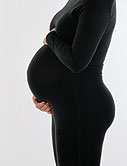
TUESDAY, April 17 (HealthDay News) — Pregnant women who are overweight and have slightly elevated blood-sugar levels are at increased risk for pregnancy complications, a new study shows.
These women have a higher risk than those who are obese with normal blood sugar or those with gestational diabetes and normal weight, the researchers said.
Doctors typically are concerned about pregnant women who are obese or have gestational diabetes, and tend to overlook those who are overweight and have moderately elevated blood sugar levels, they noted.
“These are women who have not been on our radar because they don’t have gestational diabetes and aren’t obese, but our study shows if you are one step away from each of those, you carry some significant risks,” lead investigator Dr. Boyd Metzger, a professor of medicine and endocrinology at Northwestern University Feinberg School of Medicine and a physician at Northwestern Memorial Hospital in Chicago, said in a university news release.
“We need to address the combination of overweight and blood sugar of these women as urgently as we do for women who are obese or have gestational diabetes,” he added.
The study of more than 23,000 women in nine countries found that pregnant women who are obese and have gestational diabetes and those who are overweight and have slightly elevated blood sugar are more likely to have large babies. Having a large baby increases the risk of injury to the baby during vaginal delivery, thereby increasing the likelihood of a Cesarean section, the researchers noted in the news release.
Compared to babies born to mothers with normal weight and blood sugar, babies born to obese women with gestational diabetes weighed nearly 12 ounces more. Those born to overweight (but not obese) women with slightly elevated blood sugar weighed about 7.5 ounces more. Babies born to normal-weight mothers with gestational diabetes weighed nearly 6 ounces more, and those born to obese mothers with normal blood-sugar levels weighed more than 6 ounces more.
The researchers also noted that babies born to women with excess weight and higher blood-sugar levels are more likely to have higher insulin and lower blood-sugar levels. These effects eventually may trigger obesity and diabetes in the child.
The study was published in the April issue of the journal Diabetes Care.
“The big message from this is when you look at the impact of nutrition, metabolism and weight on pregnancy outcomes, every woman — on her first prenatal visit — should get a prescription for a session with a dietitian and an appropriate healthy eating plan for her pregnancy,” said Metzger, who also is a professor of metabolism and nutrition. “This doesn’t happen but it should, and insurance companies should reimburse it.”
More information
The Nemours Foundation offers advice about staying healthy during pregnancy.

